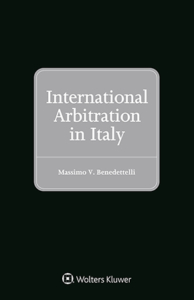Views
Nothing Found
Sorry, no posts matched your criteria
News
Massimo V. Benedettelli, International Arbitration in Italy

Arbitration community lacked a comprehensive guide in English to move through the multiple and multifaceted connections between arbitration and the Italian legal system: International Arbitration in Italy fills in this gap, addressing both international commercial and investment arbitration.
The book deeply depicts said connections, raising interpretative problems and providing solutions with the view to building a coherent system against the backdrop of the author’s thought about the phenomenon of the arbitration taken as a whole.
This approach qualifies the entire analysis elaborated on in 12 Chapters, which start with the focus on what international arbitration is and what its grounds are, then moving on how arbitration “dialogues” with the different sources of Italian law, and what the principles for the right interpretation of this law are.
The book proceeds on “traditional” topics pertaining to a handbook of international commercial arbitration (the interplay between arbitration and national courts, the arbitration agreement, the arbitral tribunal, the arbitral proceedings, the provisional measures, the law applicable to the merits, the costs of arbitration, the different awards, related challenges, recognition and enforcement) with a closing attention to investment arbitration.
International Arbitration in Italy also includes three useful appendices which gather the main provisions of Italian law on arbitration (1), the rules of arbitration of the Milan Chamber of Arbitration (2) and the list of the Bilateral Investment Treaties in force for Italy (3).
Given its well-balanced theoretical and practical approach, the book will stimulate the scientific debate while helping practitioners to handle even the trickiest cases featuring interactions between international arbitration and Italian law.
The English High Court delivers an interesting decision on Article 4(3) of Rome II Regulation
Today, the English High Court in Owen v Galgey [2020] EHWC 3546 (QB) delivered a thorough and interesting decision on Article 4(3) of Rome II Regulation, which is the general escape clause for Rome II. For a complete reading of the decision see here
European Commission seeking (private international law) experts for its European Democracy Action Plan
The European Commission on 3 December presented the European Democracy Action Plan. The Press Release explains that: “Standing up to challenges to our democratic systems from rising extremism and perceived distance between people and politicians, the Action Plan sets out measures to promote free and fair elections, strengthen media freedom and counter disinformation.”
With regard to the aim of strengthening media freedom, the Commission “will propose in 2021 a recommendation on the safety of journalists, drawing particular attention to threats against women journalists, and an initiative to curb the abusive use of lawsuits against public participation (SLAPPs).”
The Commission is seeking to establish an Expert Group against Strategic Lawsuits Against Public Participation (SLAPP). The Call defines SLAPP as “groundless or exaggerated lawsuits, initiated by state organs, business corporations or powerful individuals against weaker parties who express, on a matter of public interest, criticism or communicate messages which are uncomfortable to the litigants.”
The Call further explains: “Whilst most SLAPP appear to be national lawsuits, they can be made more complex, thus more costly to defend, when they are deliberately brought in another jurisdiction and enforced across borders, or when they exploit other aspects of national procedural and private international law. Most SLAPP suits are based on defamation claims, but there are cases based on other grounds, including data protection, blasphemy, tax laws, copyright, trade secret breaches, and similar concepts.”
Interested persons can find the call in the Register of Commission Expert Groups.


